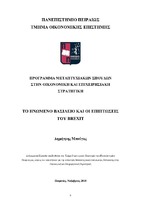To Ηνωμένο Βασίλειο και οι επιπτώσεις του Brexit
The United Kingdom and the impacts of Brexit

Προβολή/
Λέξεις κλειδιά
Ηνωμένο Βασίλειο ; BrexitΠερίληψη
Το Ηνωμένο Βασίλειο, ένα κορυφαίο εμπορικό δυναμικό και οικονομικό κέντρο, είναι η τρίτη μεγαλύτερη οικονομία στην Ευρώπη μετά τη Γερμανία και τη Γαλλία. Η γεωργία είναι εντατική, ιδιαίτερα μηχανοποιημένη και αποτελεσματική σύμφωνα με τα ευρωπαϊκά πρότυπα, παράγοντας περίπου το 60% των αναγκών σε τρόφιμα με λιγότερο από το 2% του εργατικού δυναμικού. Το Ηνωμένο Βασίλειο διαθέτει μεγάλες ποσότητες άνθρακα, φυσικού αερίου και πετρελαίου, αλλά τα αποθέματα πετρελαίου και φυσικού αερίου μειώνονται. το Ηνωμένο Βασίλειο είναι καθαρός εισαγωγέας ενέργειας από το 2005. Οι υπηρεσίες, ιδίως οι τραπεζικές, ασφαλιστικές και επιχειρηματικές υπηρεσίες, αποτελούν βασικούς μοχλούς ανάπτυξης του βρετανικού ΑΕΠ. Η μεταποίηση, εν τω μεταξύ, έχει μειωθεί σημαντικά, αλλά αντιπροσωπεύει περίπου το 10% της οικονομικής παραγωγής. Η Βρετανική έξοδος από την Ευρωπαϊκή Ένωση, είναι η επικείμενη αποχώρηση του Ηνωμένου Βασιλείου (ΗΒ) από την Ευρωπαϊκή Ένωση (ΕΕ). Από το δημοψήφισμα της 23ης Ιουνίου 2016 προκύπτει ότι η πλειοψηφία του 52% των βρετανών ψηφοφόρων υποστήριζε την εγκατάλειψη της ΕΕ. Στις 29 Μαρτίου 2017, η βρετανική κυβέρνηση επικαλέστηκε το άρθρο 50 της Συνθήκης για την Ευρωπαϊκή Ένωση. Το Ηνωμένο Βασίλειο πρόκειται να εγκαταλείψει την ΕΕ στις 29 Μαρτίου 2019 στις 11 μμ. Ώρα Βρετανίας. Η ανθεκτικότητα της οικονομίας, διαψεύδει όσους προέβλεπαν ότι η Μεγάλη Βρετανία θα ωθούνταν σε ύφεση μετά το σοκ που προέκυψε από το δημοψήφισμα του Ιουνίου για την ΕΕ. Είναι προφανώς άστοχο να συνδέσει κανείς τα θετικά σημάδια της βρετανικής οικονομίας μόνο με το Brexit – πολύ περισσότερο που αυτό δεν έχει πραγματοποιηθεί ακόμη. Αντίστοιχα όμως είναι λάθος να αποδίδει κανείς στο δημοψήφισμα τα αρνητικά στοιχεία της βρετανικής οικονομίας, όπως η πτώση της ισοτιμίας της βρετανικής λίρας και η μικρή αύξηση του πληθωρισμού. Άλλωστε η γενικότερη κρίση της βρετανικής οικονομίας ήταν ένας από τους παράγοντες που ώθησαν χιλιάδες ψηφοφόρους να αμφισβητήσουν την ακολουθούμενη οικονομική πολιτική που συνδεόταν με τη συμμετοχή της χώρας στην ΕΕ. Το μόνο βέβαιο συμπέρασμα είναι ότι όσοι προέβλεπαν εικόνες πανικού μετά το δημοψήφισμα διαψεύδονται πανηγυρικά.

